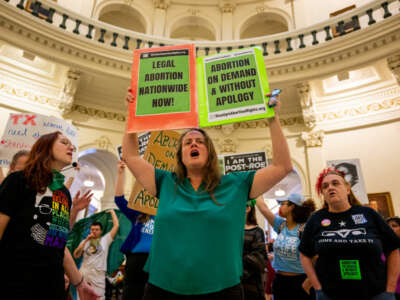HANDMAIDS TALE
A TX Woman Was Denied an Abortion Even Though Ectopic Pregnancy Was Killing HerThe case is yet another example of how Texas’s “life-saving” abortion exception has been ignored.
By Chris Walker , TRUTHOUT
February 26, 2024

PABLOHART / E+ / GETTY IMAGES
A 25-year-old college senior in Texas was denied emergency surgical care for a non-viable pregnancy — the latest example of medical providers refusing to make exceptions to the state’s total abortion ban out of fear of being criminally prosecuted.
Kelsie Norris-De La Cruz told The Washington Post that she was looking forward to the birth of her child when she discovered she was pregnant in January. However, after experiencing severe cramps and bleeding, she went to Texas Health Arlington Memorial Hospital, where she was told she likely had an ectopic pregnancy.
Such pregnancies, in which a fertilized egg develops in a location other than the uterine wall (typically in the fallopian tubes), are non-viable, and are responsible for between 5 to 10 percent of all pregnancy-related deaths.
Despite the life-threatening risks, Norris-De La Cruz was told that she should go back home until the pregnancy developed further, as there was a minimal chance that she could miscarry on her own or that the fertilized egg could migrate somewhere else. After about a month’s time — and after experiencing cramps so severe she could hardly stand up — Norris-De La Cruz returned to the hospital in mid-February.
There, two OB/GYNs and an on-call doctor at Arlington Memorial Hospital reviewed her case. According to medical records, the on-call doctor wanted to immediately perform surgery to rectify the situation. However, the two OB/GYNs refused to sign off on the surgery, a requirement at that hospital in order to perform the life-saving procedure.
A 25-year-old college senior in Texas was denied emergency surgical care for a non-viable pregnancy — the latest example of medical providers refusing to make exceptions to the state’s total abortion ban out of fear of being criminally prosecuted.
Kelsie Norris-De La Cruz told The Washington Post that she was looking forward to the birth of her child when she discovered she was pregnant in January. However, after experiencing severe cramps and bleeding, she went to Texas Health Arlington Memorial Hospital, where she was told she likely had an ectopic pregnancy.
Such pregnancies, in which a fertilized egg develops in a location other than the uterine wall (typically in the fallopian tubes), are non-viable, and are responsible for between 5 to 10 percent of all pregnancy-related deaths.
Despite the life-threatening risks, Norris-De La Cruz was told that she should go back home until the pregnancy developed further, as there was a minimal chance that she could miscarry on her own or that the fertilized egg could migrate somewhere else. After about a month’s time — and after experiencing cramps so severe she could hardly stand up — Norris-De La Cruz returned to the hospital in mid-February.
There, two OB/GYNs and an on-call doctor at Arlington Memorial Hospital reviewed her case. According to medical records, the on-call doctor wanted to immediately perform surgery to rectify the situation. However, the two OB/GYNs refused to sign off on the surgery, a requirement at that hospital in order to perform the life-saving procedure.
RELATED STORYPregnant patients face medical uncertainty and risks, from hyperemesis gravidarum to cancer treatment.By Kendall Turner , OPENDEMOCRACY February 11, 2024
Despite the on-call doctor stating that he did “not feel comfortable discharging her home” and that it was not “in her best interest” to leave without surgery, Norris-De La Cruz was discharged. Only after she sent images of her sonogram to a friend, who was visiting a different OB/GYN elsewhere, did a health provider finally tell her that she needed an abortion right away.
Norris-De La Cruz underwent that procedure, from a different hospital, 24 hours after being denied an abortion at Arlington Memorial Hospital. According to an OB/GYN who treated her at the second hospital, Norris-De La Cruz’s life would have been “in extreme danger” had she waited any longer.
After terminating the pregnancy that was causing her excruciating pain and threatening her life, Norris-De La Cruz expressed despair and anxiety, telling The Washington Post that she was worried over whether she could become pregnant again in the future.
“I was scared I was going to … lose my entire reproductive system if they waited too long. I knew it could happen at any moment,” she said.
Experts whom The Post consulted in reporting Norris-De La Cruz’s story said that she should have been granted an abortion right away, in compliance with Texas’s abortion law that allows the procedure if it is necessary to save a pregnant person’s life.
“That should have been a bread and butter slam dunk diagnosis. It doesn’t make sense to me that they would send her away, unless they had a fear that the surgery … could be perceived as causing an abortion” that violated Texas law, said Clayton Alfonso, an OB/GYN at Duke University who reviewed Norris-De La Cruz’s case for The Post.
However, there are dozens of examples of people in states with strict abortion bans — which supposedly make exceptions in medical emergencies — being denied life- or health-saving abortions due to medical providers’ fears that they could be punished by the state for violating the law.
Those fears are not necessarily misplaced, as evidenced by the case of Kate Cox, a woman in Texas whose fetus had Trisomy 18, a fatal condition that will result either in miscarriage or the infant dying within a few days of birth, and which can also threaten the health of the pregnant person. After doctors denied Cox an abortion, she appealed to the state courts. Ultimately, the conservative state Supreme Court said in December that she still couldn’t get an abortion, forcing Cox to flee the state in order to have the procedure.
Other cases abound of people being denied abortions in Texas in spite of clearly needing them. Early last year, five women sued the state after their pregnancies nearly killed them. One of those women, Amanda Zurawski, said that she got sepsis twice from her non-viable pregnancy, which resulted in scar tissue so severe that one of her fallopian tubes no longer functions.
“Nothing about this is pro-life,” she told NBC News at the time.
This article is licensed under Creative Commons (CC BY-NC-ND 4.0), and you are free to share and republish under the terms of the license.

CHRIS WALKER is a news writer at Truthout, and is based out of Madison, Wisconsin. Focusing on both national and local topics since the early 2000s, he has produced thousands of articles analyzing the issues of the day and their impact on the American people. He can be found on most social media platforms under the handle @thatchriswalker.

No comments:
Post a Comment